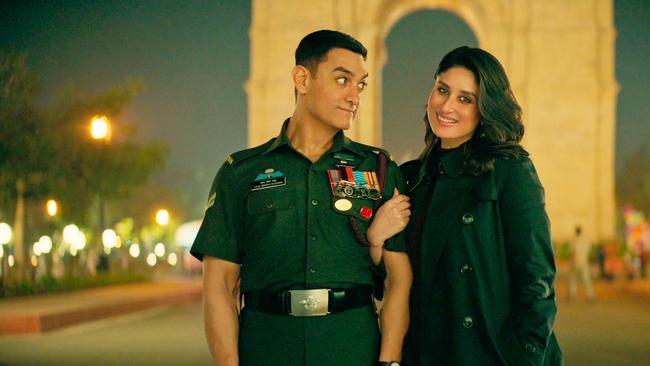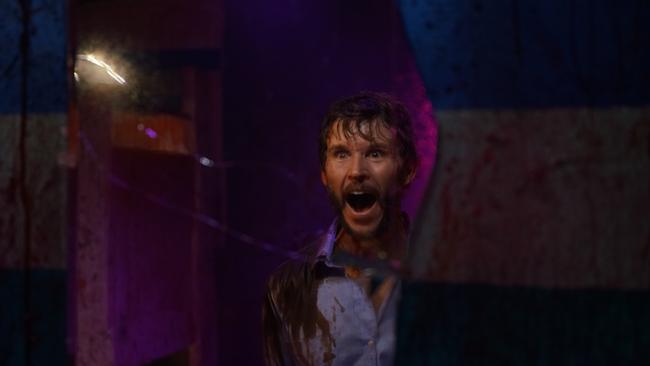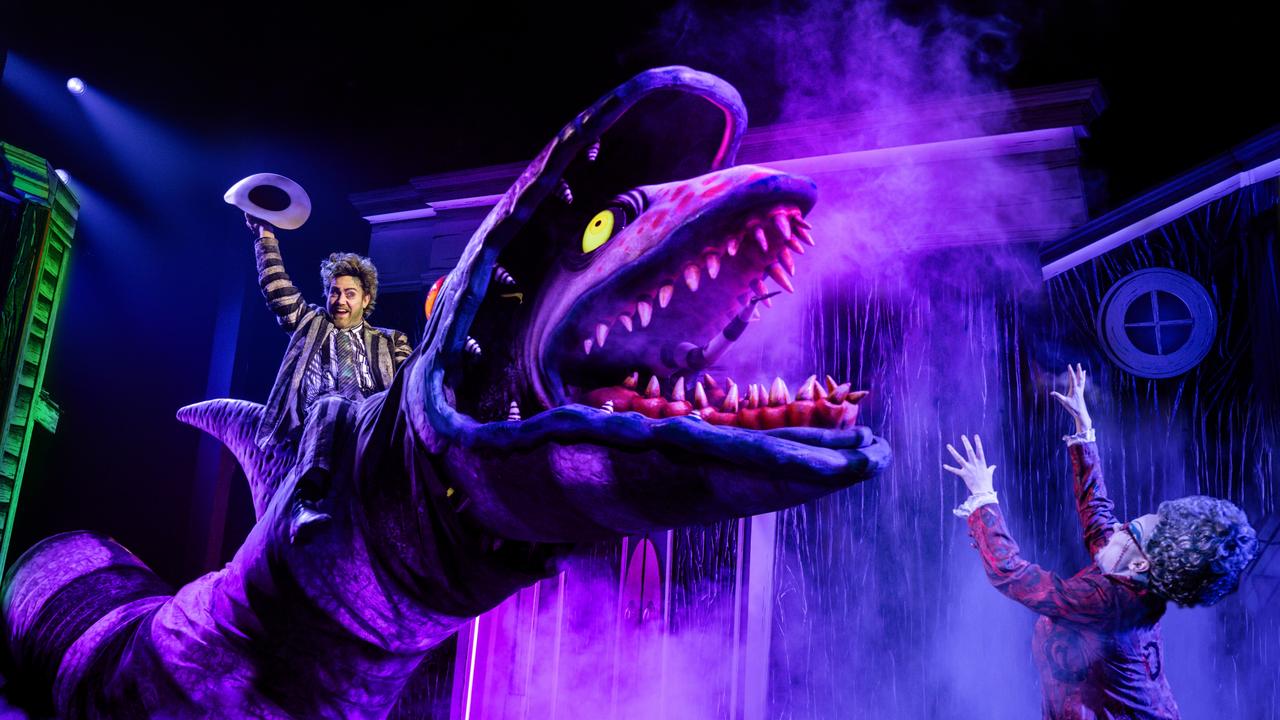Laal Singh Chaddha, Forrest Gump with a sprinkle of Bollywood
The box of chocolates are a box of the Indian sweets golgappas in this most watchable film starring Aamir Khan.

Laal Singh Chaddha (M)
In cinemas
★★★½
Can you imagine going through your life without ever doing the wrong thing? That idea – of a life lived with only good intentions – is the feel-good story of Forrest Gump, the Oscar-winning 1994 film directed by Robert Zemeckis and starring Tom Hanks.
As such it is a fantasy. And yet, now that I’m older than I was in 1994, it’s a way of being that I’d like to come closer to.
That was the feeling that gradually took hold as I watched Laal Singh Chaddha, a 160-minute Indian adaptation of Forrest Gump. It is in Hindi with English subtitles.
When the original came out, one of the talking points was the innovative visual effects that inserted Gump into archival footage, standing beside JFK, for example. There’s nothing special about that today, so while historical shots are blended into this subcontinental Forrest Gump, it’s the human story that matters most.
We meet Laal Singh Chaddha (Bollywood star Aamir Khan) on a train. In a nice nod to the original he’s wearing a blue and white check shirt. Above the shirt is an un-Gumpish thick black beard and turban.
In place of the box of chocolates he has a box of golgappas, a sweet Indian street food. He offers one to the woman sitting opposite him. His mother, he tells her, says life is like golgappas. “Your tummy may be full but your heart always craves more.”
The latter is Laal’s story, from beginning to end (he’s too polite to fill his tummy). It’s also the story of the people he becomes close to, which unfolds as he talks about his life to an increasingly captive audience in the second-class train carriage.
He starts in his childhood, and here the young actors who play the young, calliper-wearing Laal and Rupa, the girl who befriends him at school, are wonderful.
Laal loves Rupa from the beginning. He proposes to her often. Yet, as an adult, Rupa (Kareena Kapoor), has her sights sets on being a model and actor.
This movie follows the original closely (the films, by the by, have marked differences to the source material: the 1986 novel by Winston Groom).
Laal, unbearded, unturbanned, goes to college, enlists in the army, becomes a businessman, a long-distance runner and much more. He does it all with an absence of malice.
The historical connections are Indian, as one would expect: the 1999 war with Pakistan, the internal religious violence, the assassination of Indira Gandhi and, fair enough, India winning the 1983 cricket World Cup.
The personal touchstones of Laal’s remarkable life are his goodwill to all and the occasional goodwill of others towards him. It is Rupa who offers him a seat next to her in the classroom, as the other students mock the “dimwit cripple”. The Laal we see most is the younger, unbearded one. Khan, looking more Mr Bean than Forrest Gump, is perfect as this unnuanced man who achieves more than anyone thinks he can, except his mother (Mona Singh). Kapoor is terrific as the nuanced woman he loves. “I can’t be relied on,’’ she tells him after one of his proposals.
Laal’s story has powerful moments, such as the battle scenes and Rupa’s relationship with a Harvey Weinstein sort, but also lots of humour. When Laal, purportedly slow-witted but definitely fleet of foot, joins the college running team the races are very funny.
This film is directed by Advait Chandan (his second feature following the 2017 musical coming-of-age drama Secret Superstar) and written by veteran Indian actor Atul Kulkarni.
As might be expected, this project had a long prelude. Kulkarni spent a decade adapting Eric Roth’s Forrest Gump script and then it took another decade to acquire the remake rights.
Was it worth the wait? I think so. I was worried about the 160-minute running time, but this movie is never boring.
There’s a song during the opening and closing titles that asks a question that has been on my mind since: “Are we smart enough to understand life or is it wiser not to?” There’s an ambiguity there that goes to the gentle heart of this most watchable film.
-
Glorious (MA15+)
Shudder
★★★★½
“What the hell is that? You thought your human penis was going to save the universe? Your genitals are of no significance.”
So declares a “very lonely, very old god” to a deeply hungover man in the bathroom of a roadside rest stop somewhere in America.
This divine declaration follows the man’s reluctant and, as it turns out, mistaken exploration of the glory hole that lends the darkly funny Glorious its title. The glory hole is in the wall of one of the rest room stalls. It’s surrounded by a painting of a tentacled beast that looks like something out of the occultist mind of HP Lovecraft.
The stall is locked and the precise, calm, authoritarian voice of the self-declared god (Oscar winner JK Simmons) emerges from within.
He addresses the hungover man, Wes (Australian actor Ryan Kwanten), who, through flashback moments, we realise is on the run from a relationship break-up.
He carries a teddy bear that, when its paw is pressed, says, “I love you beary much”. This being the delightfully macabre movie it is, it’s a fair bet that ursine soft toy will do something unexpected.

The god seals the rest room entrance. “No one is coming to help you, friend. You’re all alone.” He explains their meeting was destined. Wes has a chance to save the universe from the extinction plan the god is otherwise inclined to execute.
“Well, that’s as ominous as f..k,” Wes notes.
To save the universe, Wes has to satisfy the god’s corporeal self. “There is only one part of you that can do that,” the patient god tells him.
Hence Wes’s understandable dip in the glory hole. But what the god needs is something far harder to deliver than a human penis. “I know it’s a lot to ask,” he admits.
Here the influence of Lovecraft’s cosmicism is apparent. Humans are but irrelevant specks in the cosmic void and so on. That’s all perhaps true but the only philosophy on Wes’s mind is the survival of the fittest.
From this point we have a locked room thriller that is bloody and funny. When another man does make it inside, briefly, the god apologises to Wes for the resultant mess. “I may have got a bit carried away.”
Simmons is perfect as this condescending god, whom we hear but do not see in full form. We glimpse bits of him, through the glory hole, via a crack in the door, and it is not a pleasant sight.
Kwanten, a Home and Away alumnus who went on to star in the American vampire series True Blood, is part straight man, part comedian, and he does it well.
This tight 79-minute comic thriller is directed by American filmmaker Rebekah McKendry, her second feature following the 2017 Christmas horror show All the Creatures Were Stirring.
This movie is on Shudder, a horror-themed streaming service that is the place to go if you like different films. It’s not as out there as another Shudder offering, The Mad God, but it’s still satisfyingly weird and ambiguous. The ending offers all sorts of possibilities that may or may not be true.
As I watched I thought about savage hangovers on the screen. Ewan McGregor driving the porcelain bus in Danny Boyle’s Trainspotting (1996) would be high on anyone’s list. Wes’s morning after the night before makes that look like a teddy bear’s picnic.




To join the conversation, please log in. Don't have an account? Register
Join the conversation, you are commenting as Logout